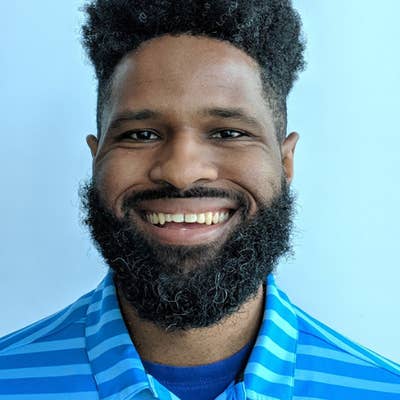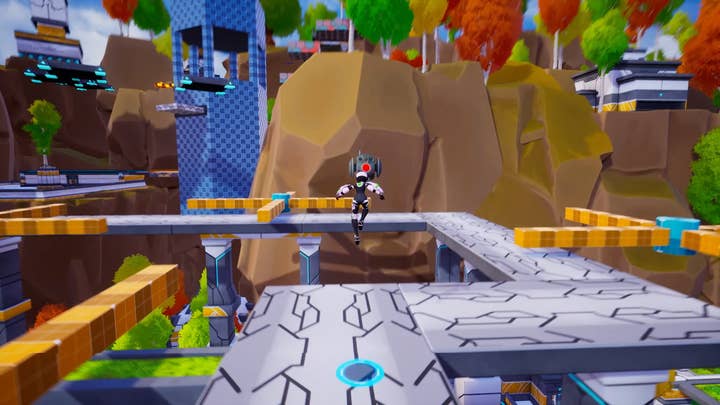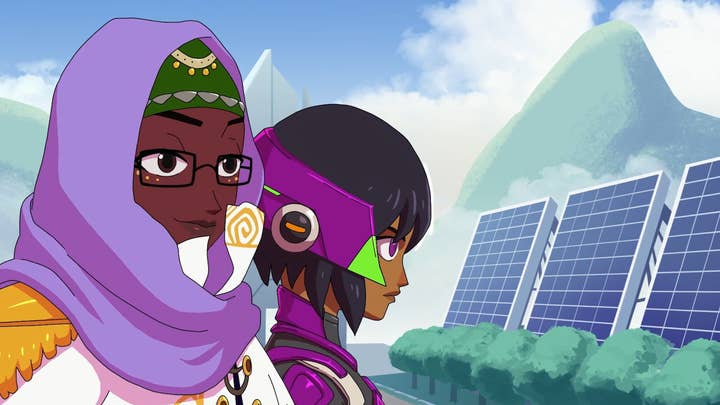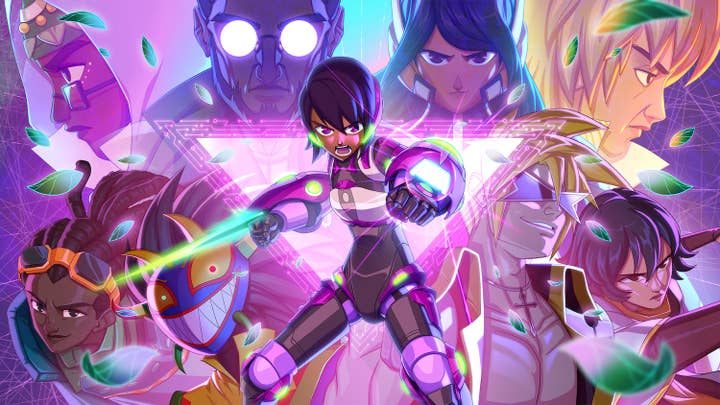Protodroid Delta's journey from Mega Man fan game to Humble-published title
Adam Kareem on making it as a solo hobbyist dev and breaking the mould of homogeneous character design
Sign up for the GI Daily here to get the biggest news straight to your inbox
Today marks the awaited release of indie title Protodroid Delta, a 3D action-platformer from solo dev Adam Kareem.
Game development is never an easy endeavour to start with, but Kareem went through it on Hard Mode, as a hobbyist developer who had to balance his dream project with a full-time job and raising kids.
"I’m a bit of a poser, you could say, because I don’t have any background in games formally," Kareem smiles. "I was studying mechanical engineering in school, and I work full-time in tech, doing hardware engineering type stuff, but I picked up games as a hobby, just because I saw games like Sonic Adventure, Mega Man X, things that I loved as a kid.
"I always felt like there would be some cool ways to improve on them. And so, I decided as a hobby to tinker with, 'Hey, maybe I can make a Sonic that controls really well in 3D', because I felt like Sonic Adventure wasn’t really doing all that."
Kareem also says that he "always hoped that Mega Man would make the jump to 3D," which is what led him to develop fan games for a couple of years from early 2018, during his winter break.

"A friend of mine told me about game engines, what Unreal was, and that’s when I started taking online classes, and just diving headfirst into YouTube. Let me tell you, not just because I work at Google, YouTube is great," he laughs, referring to his day job as a product design engineer at the tech giant.
"It’s just as easy as that, I took advantage of that. Really great YouTube channels like Matthew Wadstein’s channel, and Virtus Learning Hub, and Ryan Laley… Just folks who, out of the goodness of their hearts, are like, 'I’m going to teach some games dev stuff'. You dig with that long enough, while also making games so you can learn while doing, and then eventually I built up this competency in games.
"But I felt like what I brought to the table was always just a design[-centric] thinking about, fundamentally, why doesn’t this work as a mechanic? Why is this aesthetic of a character appealing or not appealing? That’s my identity."
Kareem gave a GDC talk earlier this year about his background and inspirations, entitled "Finding Inspiration and Planning Luck: A Story of a Solo Dev-Dad of Color."
He still works full time and is "still a hobbyist, technically," he smiles. We talk about that balance, reminiscing over a quote from Strange Scaffold's Xalavier Nelson Jr. about "operating from a place of stability" when a dev and destigmatising the idea of maintaining a day job.
"That’s a really insightful perspective too, because I felt so liberated in terms of the creative choices I could make, in terms of the timeline the game was going to be, because I wasn’t depending on it for my wellbeing, for my livelihood," Kareem says.
"Since I had a job which was compensating and taking care of myself and my family, it gave me a comfort of, I can just tinker with this mechanic for a week, two weeks, whatever, and I’m not pressing up against schedules, deadlines. It’s not going to be like, 'Sorry folks, I can’t pay you for the next month', and have that kind of consideration. I think normalising that would be really great. I would caution though, that if you are doing that, make smaller games. I wish I had known how big this thing would get when I got into it. But it’s definitely very tough, doing both."

Kareem started working in earnest on what would become Protodroid Delta in late 2019 after releasing a handful of fan games based on Sonic and Mega Man, some of which were received really well. But he had reached a barrier – as good as the titles were, he couldn't go anywhere with them because he obviously didn't own the IPs.
"I was like, ‘Well, I’m spending hours, really just pouring so much of myself into this, that I should at least remove the barrier of wanting to go commercial with it, and just really, truly make it my own'. And so, that’s where Protodroid came from. It was like, 'Okay, what are some ways that I can be inspired by the Mega Man thing?'
"It all sprung from that fan game. And I got confidence that that was the route to [take], because I put it up on Itch.io, I put it up on Game Jolt, and it got a few thousand plays, and people just kept commenting, ‘This is fun! Oh, this is what [Mega Man] X7 should have been'. I got these proof points. I was like, 'Okay, all the fan games you make, take this one, and now create a world of your own that you can then do whatever you want with'."
The project got picked up by Humble Games as part of its first Black Game Developer Fund in 2020. In fact, it will be the first title from the fund to be published under the Humble Games banner.
"I felt so liberated in terms of the creative choices I could make, because I wasn’t depending on it for my livelihood"
But before that, Kareem ran a Kickstarter campaign that raised almost triple the amount he was initially hoping for (over 1,600 backers pledged almost $60,000 with an initial goal of $20,000). When asked about the challenges he met with crowdfunding, he laughs: "How much time do you have?"
"Kickstarters are super hard," he continues. "Why are they hard? Because it’s very helpful if you can hire a marketing team or a studio to run that. What people don’t know about Kickstarters is that the ones that are successful run ads. Now, A/B testing, trying to find the best ads to run, [and] managing all that is a full-time job in and of itself, on top of the three or four months I took to build up the Kickstarter page.
"So, I would say the biggest challenge with Kickstarter is just how to run your ads successfully, or basically how to successfully get the word out on a continuous basis, because that’s what funnels in the funding for it."
But the successful Kickstarter is also what helped attract Humble's attention.
"The Black Game Developer Fund was amazing, because it’s something they created in response to the Black Lives Matter uprising and social movement, and they put their money where their mouth was," Kareem says. "They were really like, 'We want to make an effective change', and what better way to do that than to highlight people who are already in this space and creating?"
The financial help came with "no strings attached," Kareem adds.
"It wasn’t like, 'And once you’re done, we have the IP' or 'once you’re done, we have first rights at publishing'. It was just like, 'You do whatever you want with it. We just hope to see some sort of vertical slice, just some sort of progress'. Just 'Go, be happy. Do your thing.’
"It all sprung from that fan game. And I got confidence that that was the route to [take]"
"The side benefit from that was they connected me with an industry veteran in Justin Woodward, and he’s amazing. And he has been, in so many ways, a champion and advocate for my project, and connected me with the right people throughout the journey. And that was the Trojan horse of gifts. I was just expecting the money, but then he was a big part of all the things that sprung out from that."
Woodward is one of the two strategic advisors of the Black Game Developers Fund, appointed by Humble in October 2020, alongside Sithe Ncube. We talked to them last year about the venture's steps to independence.
In a funny turn of events, Humble did end up signing a publishing deal for Protodroid Delta, even though Kareem initially wanted to go it alone, wishing to retain full control over his dream project.
"I initially wanted to go with self-publishing because, given my work commitments, I always cherished the total freedom I had, that I can launch this game whenever I want to. I can add or remove features whenever I want to. And I really cherish that total autonomy. This was just going to ship to PC, and I didn’t have to ship to other consoles and stuff. But Humble was just such an amazing partner. I was worried about the strings that come attached. But they were just very transparent, and then offered publishing support."

That helped Kareem to continue developing the game he really wanted to make, this 3D platformer with a distinct personality, with character design being a particularly important aspect for him.
"[The characters] do look deliberately different from the rest of the gaming industry for the most part," he says. "And that’s really important to me. You look at so many games [and] the characters are all pretty much homogenous. They’re either represented as white or fairer skinned.
"You look at Smash Bros, for example, the base roster is 64 selectable characters, how many have darker skin? You’ve lost 40 right there, because none of them do. How many are not animals? You lost 22 more. And the only thing you’re left with is Ganondorf and Mr Game and Watch. So, you get little kids like me, who are like, 'Which character looks like me? The one who is evil incarnate or Mr Game and Watch'.
"I wanted to be very deliberate with my character design to create characters for folks who seldom see themselves in gaming"
"So I wanted to be very deliberate with my character design to create characters for folks who seldom see themselves in gaming, and to sample from different cultures. One of the neighbourhoods I used to grow up in was mixed Black and Latino, and those are two communities that often aren’t featured primarily within games. I wanted to create a space and a game where that is the case, so it becomes less 'un-normal' the next time it happens."
A fairer portrayal of women was also an important aspect for Kareem, who notes that they're seldom the lead character in games, often relegated to being a support character, a love interest, or a plot device.
"I wanted to invert that, and instead make a game which is predominantly female, [where] the central narrative conflict is amongst two women, and the heroes are women. And I think people resonated with that, to see a game which is being deliberate about that. It’s an important thumbprint about the game."
We chat about the lack of representation across games, with Kareem pointing to major franchises such as Final Fantasy, which has a predominantly white cast.
"Once you peel it back a bit, you realise that we’re making deliberate choices to exclude certain groups and cultural expressions"
"They’re making deliberate choices about which cultures people are deeming desirable or interesting, and it’s a very narrowly defined space about what a fantasy setting can look like, and what these things can look like," Kareem notes. "It’s an interesting question, but once you peel it back a bit, you realise that we’re making deliberate choices to exclude certain groups and certain communities and cultural expressions, and making deliberate choices to highlight other ones."
Looking ahead, Kareem acknowledges that his position, working full time and developing a big game on his own in parallel, might not be sustainable in the long run.
"Something has to give. So, I’m interested to see what sort of smaller hobbyist things I might be able to get into. Or depending on how this game does, maybe that changes my fortunes, and I’m like, 'I’m rich, I can do whatever I want!' That’s the dream," he laughs.
"But realistically, that’s highly unlikely. So, I do know that doing this for three years, it comes at a cost, I spent less time with my kids, I spent less time with my wife. And mentally, I haven’t slept in three years. And so, those things, I would not want to relive, and so I’d have to do some seriously creative problem-solving or thinking, to see what are some ways around that."
Sign up for the GI Daily here to get the biggest news straight to your inbox

